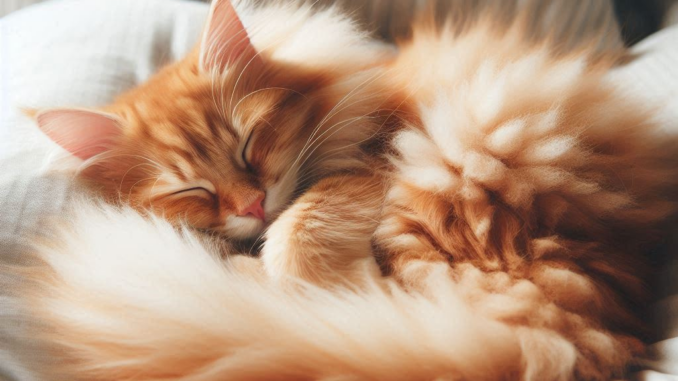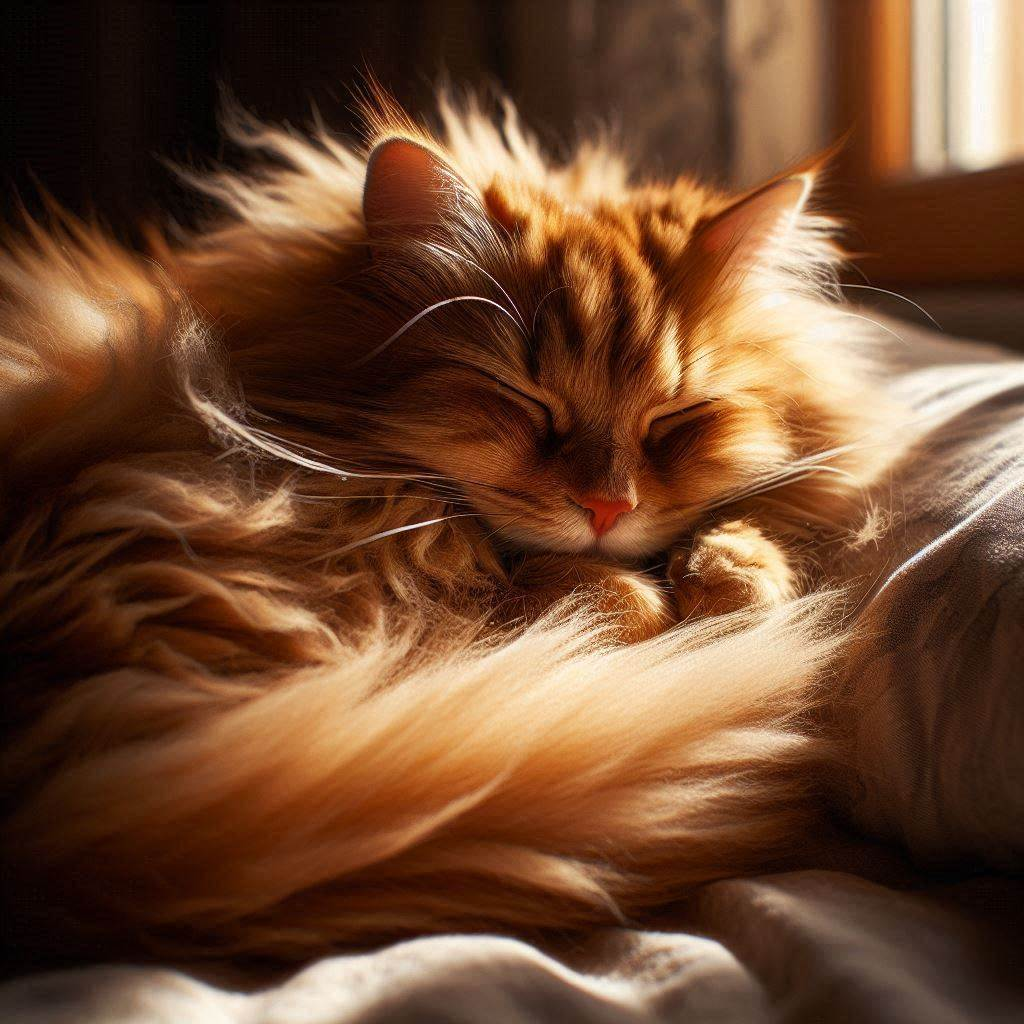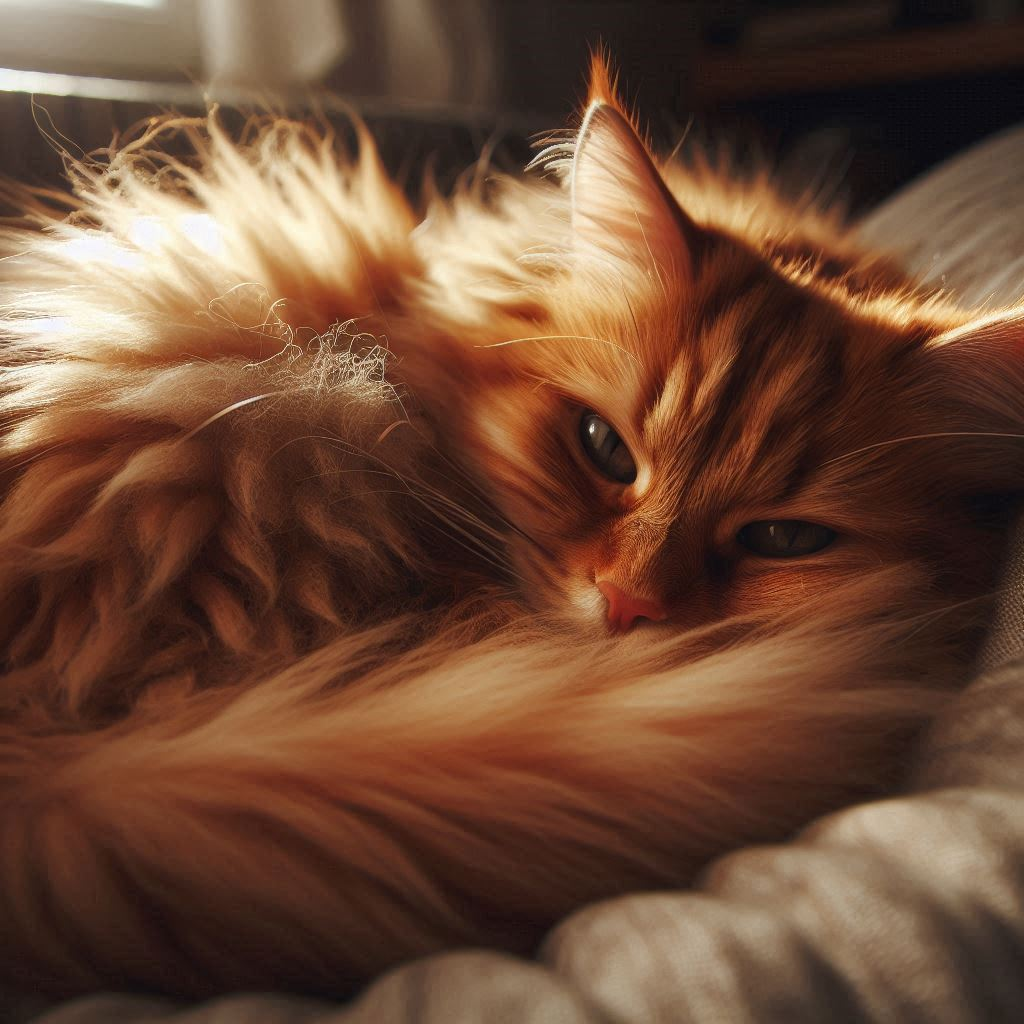
Why Does My Cat Sleep on My Pillow?
If you’ve ever woken up to find your feline friend curled up on your pillow, you’re not alone. This common behavior often leaves cat owners scratching their heads. Why do our furry companions choose our pillows as their favorite sleeping spot?
In short, cats sleep on our pillows because they seek warmth, comfort, and closeness to their human companions. This behavior also allows them to mark their territory and feel secure in their environment.
Let’s dive deeper into this fascinating feline habit and explore the reasons behind it, as well as some solutions if you’d prefer your pillow to yourself.
The Science Behind Your Cat’s Pillow Preference

Seeking Warmth and Comfort
Cats are naturally drawn to warm, soft surfaces. Your pillow, still cozy from your body heat, provides the perfect snug spot for your furry friend. In the wild, cats seek out warm places to conserve energy and stay comfortable. Your pillow mimics this ideal environment, making it irresistible to your pet.
According to a study by the Journal of Feline Medicine and Surgery, cats prefer temperatures between 86°F and 97°F (30°C to 36°C). Your pillow, warmed by your head throughout the night, falls right into this sweet spot.
Scent and Security
Cats have a highly developed sense of smell, with about 200 million odor sensors in their noses (compared to our mere 5 million). Your pillow carries your scent, which is comforting and reassuring to your cat. By sleeping on your pillow, they surround themselves with your familiar odor, creating a sense of security.
Dr. John Bradshaw, a cat behavior expert, explains, “Cats use scent as a way to create a shared group scent with their human family. Sleeping on your pillow allows them to mix their scent with yours, reinforcing your bond.”
Bonding and Affection
Contrary to popular belief, cats are social creatures. Sleeping near you is a sign of trust and affection. By choosing your pillow, your cat is expressing their desire to be close to you, even during sleep.
A survey conducted by the American Pet Products Association found that 62% of cat owners allow their pets to sleep in their beds. This high percentage indicates the strong bond between cats and their human companions.
Territorial Instincts at Play
Marking Their Space
Cats are territorial animals, and your pillow represents prime real estate in their domain. By sleeping on it, they’re essentially saying, “This is mine, and so are you!” This behavior stems from their wild ancestors, who would mark their territory to ward off competitors and potential threats.
Your cat has scent glands on their face, paws, and flanks. When they rub against your pillow or knead it, they’re leaving their scent behind, effectively claiming it as their own.
The High Ground Advantage
In nature, cats often seek high vantage points for safety and to survey their surroundings. Your pillow, typically at the head of the bed, provides this elevated position. It allows your cat to feel secure while keeping an eye on their environment.
A Personal Tale of Pillow Sharing
I remember when my cat, Whiskers, first started sleeping on my pillow. It began one chilly autumn night when I woke up to find him curled up right next to my head, purring contentedly. At first, I found it adorable, but as the nights went on, I realized I was getting less and less pillow space for myself!
I tried moving Whiskers gently, but he’d always find his way back. It became clear that this wasn’t just a passing phase – Whiskers had claimed my pillow as his new favorite spot. While I loved the closeness, I also needed my sleep. This led me on a journey to understand why he was so attached to my pillow and how we could find a solution that worked for both of us.
Addressing Your Cat’s Pillow Obsession

Creating Alternatives
If you’d prefer your cat to sleep elsewhere, it’s important to provide appealing alternatives. Here are some strategies to try:
- Cozy Cat Bed: Invest in a soft, warm cat bed and place it near your own bed. This gives your cat a comfortable option that’s still close to you.
- Heated Pet Pad: Consider a heated pet pad to replicate the warmth your cat seeks from your pillow.
- Elevated Perch: Install a cat perch near your bed to satisfy your cat’s desire for height and security.
- Scented Bedding: Use a piece of your clothing or a blanket with your scent on their new bed to make it more appealing.
Positive Reinforcement
Encourage your cat to use their new sleeping spot with positive reinforcement:
- When you see your cat using the new bed or perch, offer praise and treats.
- Gently move your cat to the new spot if you find them on your pillow, following up with affection and treats.
- Be consistent in your approach, as it may take time for your cat to adjust to the new routine.
Maintaining the Bond
Remember, your cat’s desire to sleep on your pillow is often a sign of affection. Even if you’re redirecting this behavior, it’s important to maintain that bond:
- Spend quality time with your cat before bedtime, engaging in play or cuddling.
- Consider allowing your cat to sleep on the bed, just not on your pillow.
- Provide plenty of attention and affection throughout the day to reinforce your bond.
When to Seek Professional Help
While sleeping on your pillow is usually harmless, sometimes it can indicate underlying issues:
Anxiety or Stress
If your cat suddenly starts sleeping on your pillow and shows other signs of stress (like excessive grooming or changes in appetite), it might be worth consulting with a veterinarian or a certified cat behaviorist.
Medical Concerns
In rare cases, a sudden change in sleeping habits could be linked to medical issues. If you notice other unusual behaviors or symptoms, it’s always best to check with your vet.
Embracing Your Cat’s Quirks
At the end of the day, your cat’s desire to sleep on your pillow is often a testament to the strong bond you share. Whether you choose to redirect this behavior or embrace it, understanding the reasons behind it can help deepen your connection with your feline friend.
Remember, every cat is unique. What works for one might not work for another. Be patient, observe your cat’s preferences, and don’t be afraid to try different solutions until you find what works best for both of you.
Wrapping Up: A Purr-fect Night’s Sleep
Understanding why your cat sleeps on your pillow is the first step in addressing this behavior. Whether it’s for warmth, comfort, security, or simply to be close to you, your cat’s choice of sleeping spot says a lot about your relationship.
If you decide to encourage alternative sleeping arrangements, remember to be patient and consistent. Provide appealing options and use positive reinforcement to guide your cat to their new spot. And if you choose to share your pillow with your feline friend? Well, there’s nothing wrong with that either!
Ultimately, the goal is for both you and your cat to get a good night’s sleep while maintaining the special bond you share. Sweet dreams to you and your furry companion!
We’d Love to Hear from You!
Do you have a pillow-loving cat? We’d love to hear your stories and experiences in the comments below. Share your tips for creating the perfect sleep environment for both you and your feline friend!


Leave a Reply